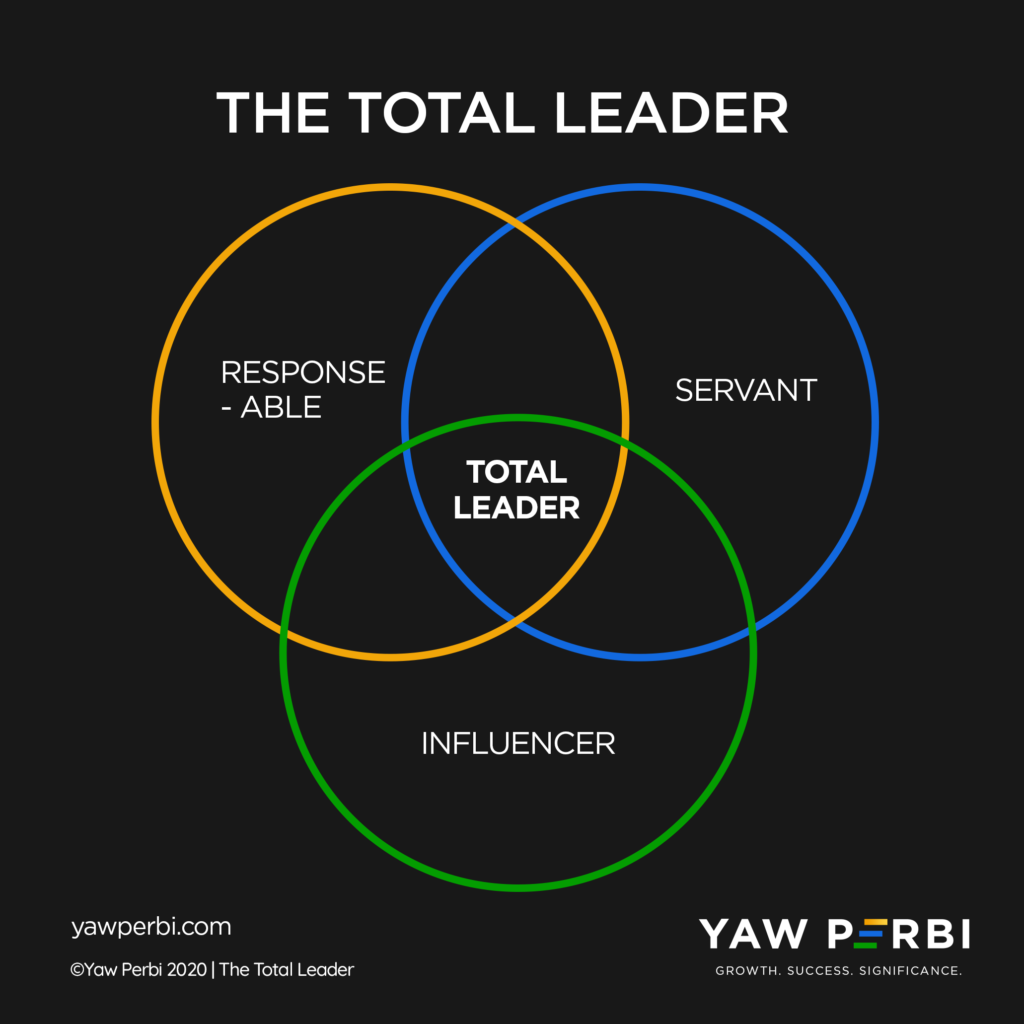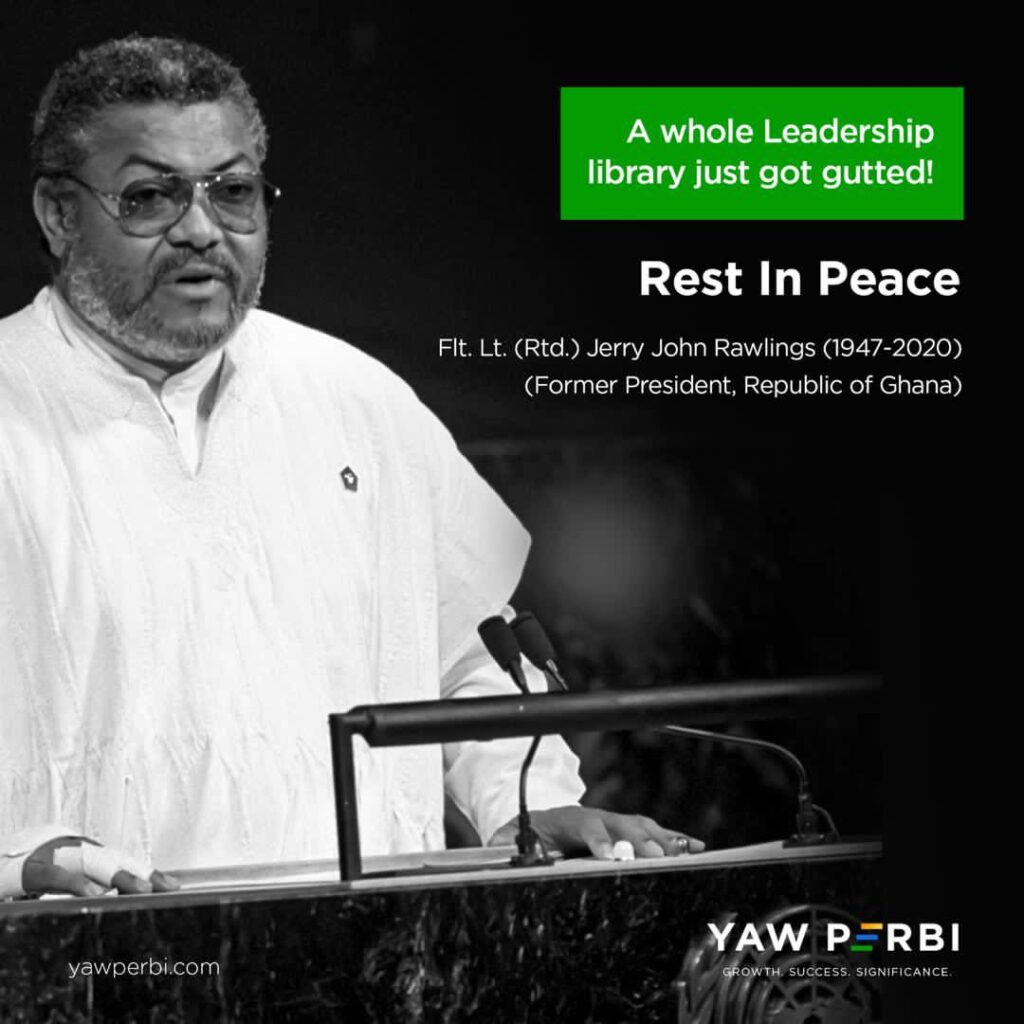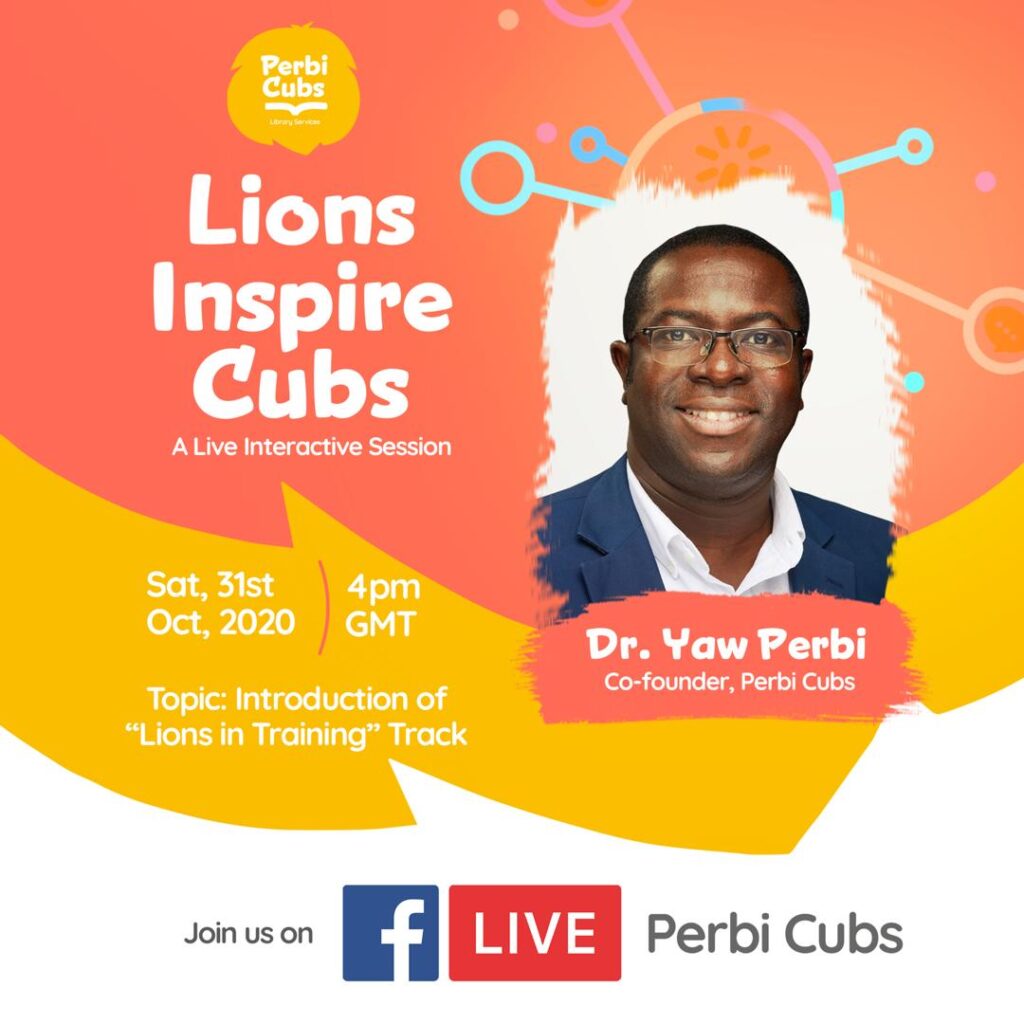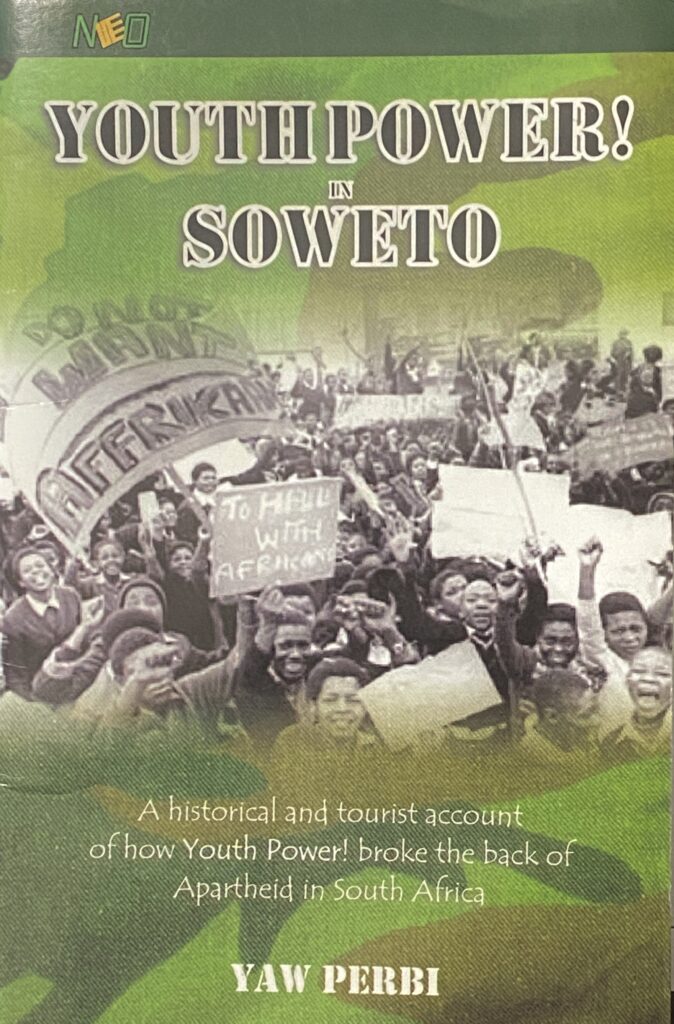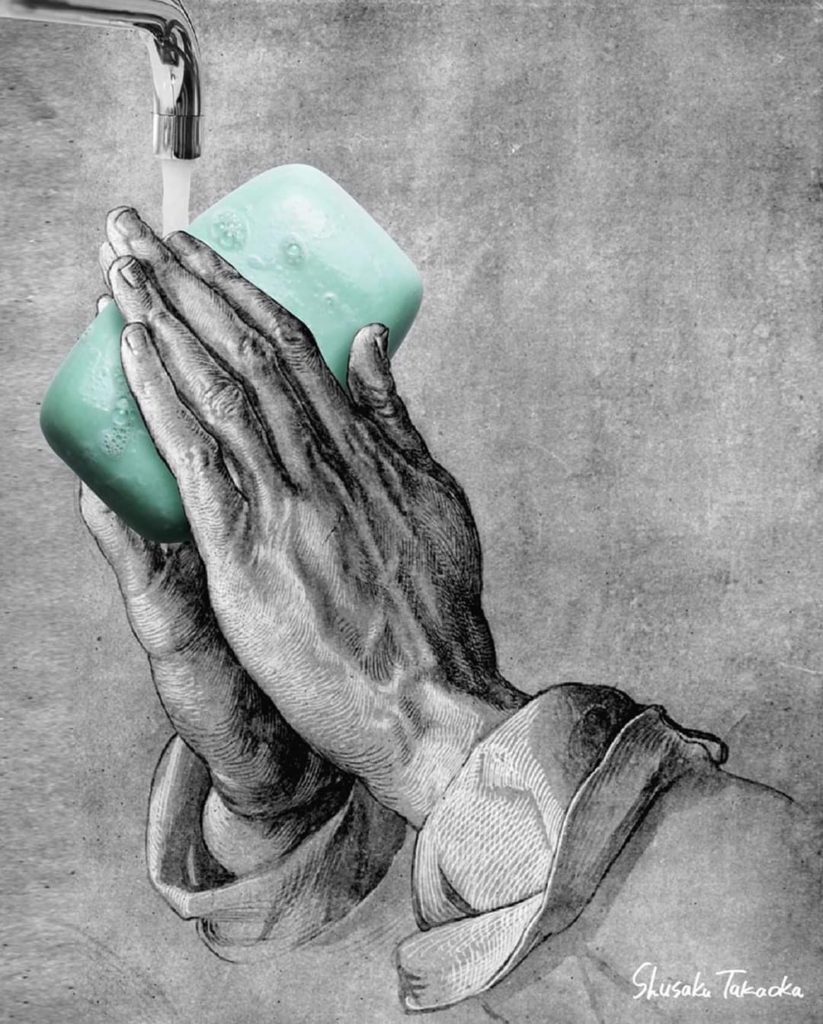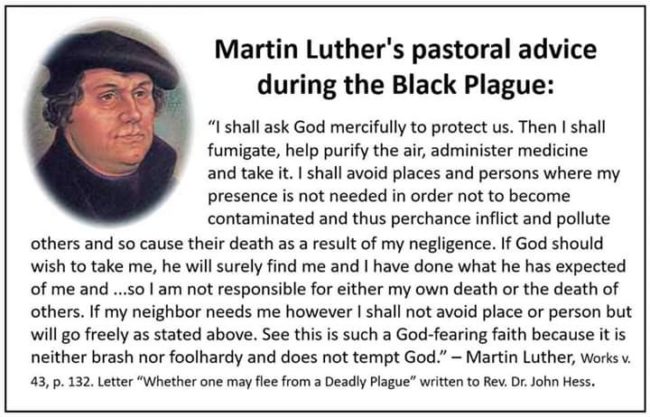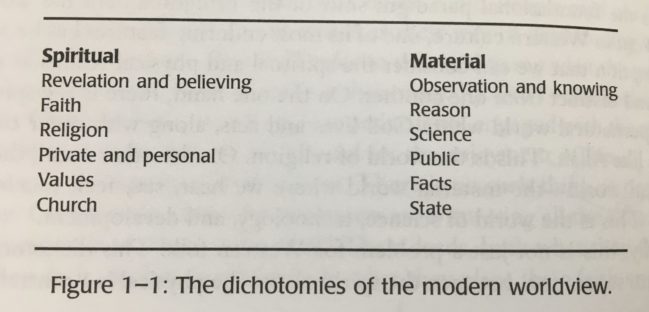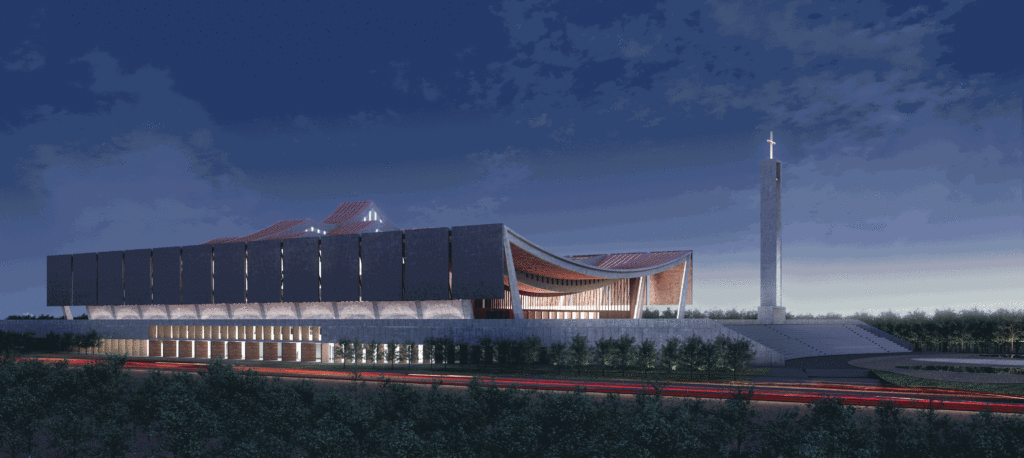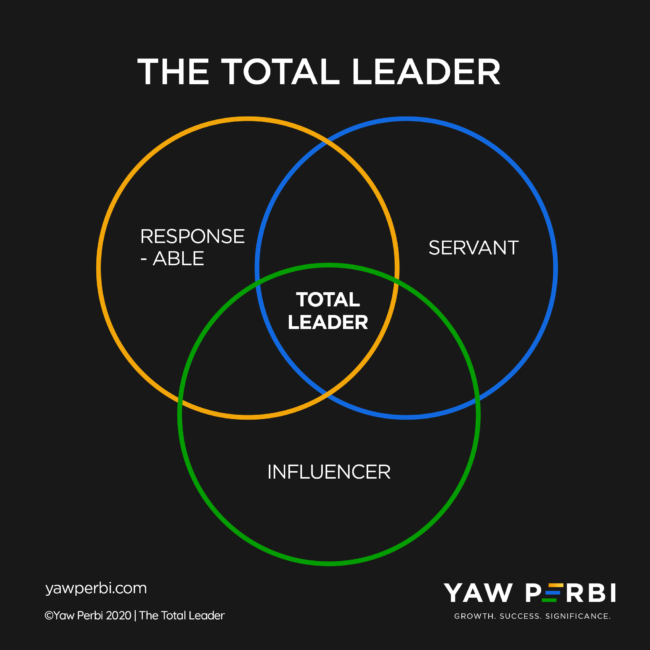
All these politicians are falling over themselves just to SERVE us?
I doubt it. I am skeptical that all these politicians are falling over themselves just to serve us, we the people. After a couple of decades of being a student of leadership, including a Masters in Global Leadership, I came to this simplicity at the far end of complexity that leadership is basically response-ability, service and influence. A total leader is and does all three. But even service has different degrees.
A few years ago some people were very cross with me after I mentioned on a live television interview on Good Evening Ghana that the then Ghanaian president wasn’t much of a leader (in terms of influence). He was very response-able, no doubt. I knew that quite well personally since we used to live in the same residential area and attended the same church. The honourable gentleman was a great servant as well–even as vice-president he was still volunteering to do such ‘menial’ tasks in the community. Such a role model in humility. But his charisma and ability to make things happen in and through others (influence) left much to be desired.
Of course there are those who are great public influencers but can’t even be response-able in their own marriage or toward their children. Such incomplete leaders are asked by the lawyer-turned-preacher, Paul, in the ancient texts, not to vie for leadership in the church. Here is the rhetorical question the trained lawyer poses: “for if someone does not know how to manage his own household, how will he care for God’s church?” A total leader is response-able, serves and influences. Now a focus on servanthood.
SERVANT-LEADER TAUTOLOGY
Ideally, the term ‘servant-leader’ should’ve been tautological as a leader necessarily must be one who serves. Unfortunately, more often than not, it isn’t so. Leadership is often anything but service. In fact, leadership is so much more synonymous with influence that when Robert Greenleaf introduced the term servant-leader around 1970 he literally mean servant-influencer. Here’s what he says in his The Servant as Leader essay back then:
The servant-leader is servant first. One wants to serve first; then one aspires to lead [influence]. This is sharply different from one who is leader [influencer] first, perhaps because of the need to assuage an unusual power drive or to acquire material possessions. A servant-leader focuses primarily on the growth and well-being of people and the communities to which they belong. The servant-leader shares power, puts the needs of others first, and helps people develop and perform as highly as possible.
THE MYSTERY OF MINISTERS
On a recent Lions Inspire Cubs hangout with children (7-14 years) to introduce them to leadership early, some of the cubs literally gasped when they heard me say that the ministers of state that throw their weight around are actually our servants. “Whaaat?!” Yes, minister is the same word as servant. Who could blame these children, for they have hardly seen as humble servants neither the ministers in politics nor ministers in pulpits. I often quip that if I ever became president of a nation I would change the term ‘ministers of state,’ in order to hear it afresh and for shock effect, to ‘servants of state.’
The last couple of months have been a heated political season on both sides of the Atlantic, particularly with my neighbours to the south (the United States border is barely 45 minutes from where I live in Montreal) and in my homeland Ghana. As I’ve seen the passion and commitment in the campaigning, counting of votes, recounting of votes, challenges in court etc. I can’t help but ask: All these politicians are falling over themselves just to SERVE us, we the people? Perhaps a very tiny fraction but largely no; it is mostly to serve their parochial interests. Even for those response-able influencers who are genuinely laying themselves down to minister to us as servant-leaders may I ask: what kind of servant will they be?
SERVANT? WHAT KIND?
Just as “love” is just “love” in English but has at least four variants in the Greek, the ancient Hebrew text is rich with a variety of words for “servant.” Four of these different hues of servant are Ehbed, Abad, Sakyir and Sharath. Let me explain.
1. LOVE SERVANT (Ehbed): This type of servant is totally sold out to those (s)he serves, not so much out of obligation and duty or for financial compensation but pure love. The Hebrews of old were not allowed to enslave their own. If any of their own people—Hebrew men or women—however sold themselves to someone (usually out of dire socioeconomic hardship) they were to serve their fellow Hebrew employer only for six years maximum. In the seventh year they must be let go free, liberally loaded with gifts of livestock, grain and wine. But there was a caveat: “…if your servant says to you, “I do not want to leave you,” because he loves you and your family and is well off with you, then take an awl and push it through his earlobe into the door, and he will become your servant for life (you may read the entire text here). The love servant is one at the complete disposal of the person(s) they serve out of love. Are you (or those you’re voting for) at the complete disposal of the people out of love?
2. SACRIFICIAL SERVANT (Abad): This one has given up a lot to serve. They are characterized by complete sacrifice. This is typically a servant who gives up personal rights, including inheritance, in order to work in the fields or tabernacle (see Numbers 18:7 and 23). The Levites of old were abads. As The Maxwell Leadership Bible puts it, “in a similar way, leaders must sacrifice their rights and stay surrendered to the cause.” Are you this kind of sacrificial servant-leader?
3. HIRED SERVANT (Sakyir): This is the quintessential ‘paid professional.’ In other words, a ‘hired hand.’ Irrespective of what they do, there is a clear understanding that they are hired per hour/day/week/whatever and will receive due compensation. Whether it is fair wages or not is not the object of this discussion; their service is paid for. Remember the love servant conversation above (under ehbed)? When a Hebrew sold themselves to work for another Hebrew they were to be treated as hired hands and then contract automatically ended after six years. It is after this they can choose to become a love servant (see Leviticus text). Unfortunately, the closest thing to a servant I see with many ministers of state and church alike is that of a ‘paid professional’. And you know corporate leaders are not there to serve either when they pay themselves fat salaries and juicy bonuses on the backs of suffering employees, even when their companies are struggling for survival! It’s the money and the trappings of the position that is the draw, not love (ehbed) or sacrifice (abad).
4. MENIAL SERVANT (Sharath): This is the down low of service. This is the most beautiful when done not because the servant-leader has no more nobler service to do but a choice to go down low for the sake of raising the people/mission up high. Sharath is the Hebrew word used to describe Joseph’s servanthood in prison (see here) and Joshua’s attendance to Moses as his aide (see Exodus text). A true leader must serve the people and the cause, irrespective of how down low the role may be. By the way, this same Sharath word in certain contexts can stand for worshipper.
MODELS: ANCIENT & MODERN
Politicians like Nelson Mandela are too few. I remember as a boy when he was released from prison in February 11, 1990 after 27 years! The whole town where I lived erupted with joy and the sound of cars honking was deafening. Mandela sure had influence–he was a leader. Of that day of freedom he said, “As I walked toward the prison gate and was among the crowd, I raised my right fist and there was a roar. I had not been able to do that for 27 years. It gave me a surge of strength and joy.”
But you know what else he had? The spirit of servanthood. That same evening when he spoke to a large crowd at the Grand Parade in Cape Town, he said, “I stand here before you not as a prophet but as a humble servant of you, the people. Your tireless and heroic sacrifices have made it possible for me to be here today. I therefore place the remaining years of my life in your hands.” I don’t know about you but I can’t help seeing an ebed, abad, sakyir and sharath all wrapped up in one in the man, his words and works–from prison to president.
The ultimate example of leader as servant is the greatest leader who ever lived, Jesus Christ. He called himself ‘Son of Man’ and did not just ‘talk servanthood’ but walked the talk. Anyone who could teach as he did and perform miracles and draw crowds of 15,000 some two millennia ago without social media sure had influence. It is he who called his followers who were jostling for political power, to sit at his right and left in their perceived imminent government of Jesus, and said to them:
“You know that those who are regarded as rulers of the Gentiles lord it over them, and their high officials exercise authority over them. Not so with you. Instead, whoever wants to become great among you must be your servant, and whoever wants to be first must be slave of all. For even the Son of Man did not come to be served, but to serve, and to give his life as a ransom for many” (Mark 10:42-45).
I can’t speak for leaders of other faith persuasions but for Christ-followers there is no choice but to love and live and lead like the ultimate servant-leader. Paul writes, “In your relationships with one another, have the same mindset as Christ Jesus.”
CONCLUSION
I initially wrote this piece with a holier-than-thou disposition thinking I was a reasonably good servant-leader myself only to get my bubble burst by my dear wife who gave me painful feedback that I needed to hear: “At home you are more like a boss-servant–a boss who tries to serve. You serve alright but only when you want and how you prefer to.” Ouch! I’m eating humble pie right now.
In the words of my mentor John C. Maxwell, “Leaders must never forget that God calls them to serve. If our Lord [Jesus] could wash His disciples’ feet as a sharath, then how could we frown at becoming an ebed?” So you too, take a long look at the list of four servant types above and a good look in the mirror: which kind of servant are you? Then linger awhile over the lengthy list of those longing for your vote and see whether they are preoccupied with status, salary and stuff or serving. True leaders serve their people towards their purpose; not their parochial interests. I am a recovering boss-servant.
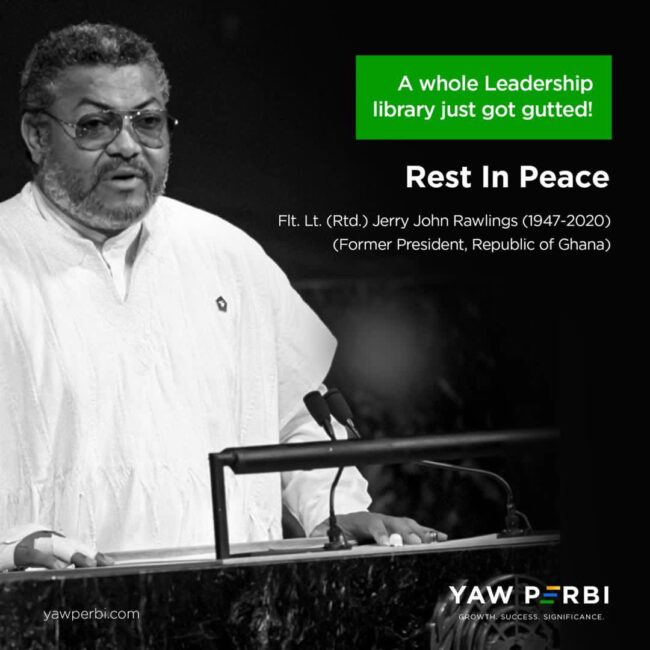
Oh, J J and the “Revolution”
While I hope Ghana’s former president Jerry John Rawlings does Rest In Peace, his passing has evoked many memories and a slew of strong sentiments–the good, the bad and the ugly. My father was Chief Accountant of the Social Security Bank at the time of J.J.’s ‘revolution.’ I have often touted my dad’s integrity. Here’s one of his recent reflections on how his integrity and God’s grace saved his skin during the days of the ‘revolution’, quite literally.
After the apparent unfinished business in 1979, JJ came back onto the public scene by ousting President Hilla Limann on 31st December, 1981. The mindset was people were corrupt; more corrupt than the public acknowledged, and far more widespread.
Soldiers entered our premises where we were staying, at a place called Pig Farm, in Accra. Word must have gone somewhere that our landlady Mame Boatema was hoarding cloth. Her trade was selling cloth at Makola, and there was a concept called “ hoarding”: some sellers used to keep some of the items for sale away from public view, partly in order to create shortages and hence sell what they had at higher prices, and partly, on a much lower scale, in order to pass them on to their favorite patrons and customers. It did not matter whether the things in your possession were legitimately acquired by you or not; if the quantity constituted more than a certain perceived number, you were branded as hoarding, and you suffered consequences. Consequences; various consequences, from outright seizure of the items, to sometimes seizure plus beatings.
On this evening, we had closed from the office and were home when all of a sudden soldiers entered our house. We were then occupying the lower floor of a two-storey building, Mame Boatema the wife of the landlord occupying the top floor. Apparently the soldiers had climbed up, done their search, found nothing and upon descending opened our front door without knocking and entered. Ma gave them a questioning look; I signaled to her to keep calm. They went to every room, found nothing of what they suspected, and left.
When they left, Mame Boatema went to the entrance of the house and shouted to all who were in hearing range, and somehow addressed to neighbours across the road whom she suspected may have sent false information to the soldiers that she was hoarding cloth, how disgraceful they had turned out to be, seeing that nothing untoward was found in the search.
That was just one domestic scenario. There were several in several places, many receiving beatings etc. Soldiers were all over the place, with an agenda they only knew, but mainly looking for “ enemies of the revolution”: namely people who were profiteering.
I was then chief accountant of the Bank ( SSB), one of the departments under my purview being the Stores. SSB was a very popular bank those days. It had been set up by the late Dr Appiah as a subsidiary of the national pension institution SSNIT, and was intended to help fill some identified gaps in the banking industry. Its department called Consumer Credit Department specifically set up to offer workers loans to buy consumables – fridges, freezers, cookers etc- was very popular with workers. The inflation in the country was not only in double digits but also the changes were so rapid that workers were no longer able to source loans easily to buy their needs. Members of staff felt very much appreciated by members of the public- and apparently also envied and hated by some – notably those who could not access the credit for one reason or the other.
Another aspect of SSB’s uniqueness was its opening of cocoa branches. These were new branches at cocoa farming and buying centres to assist cocoa farmers offer their cocoa sales receipts to the Bank for cash/credit. Prior to this, hard-working cocoa farmers after harvesting and selling their cocoa would only be given sales receipts which they had to hang on for very long periods of time and at the mercy of the traditional banks which were not many to start with, nor operating in thick rural areas. This made the Bank also very much appreciated by cocoa farmers.
In addition to this, warehousing finance whereby importers of goods, usually consumables, could access funds from the Bank usually to finance customs and clearing charges of imports by depositing the products in the Bank’s warehouse and have them released in bits based on how they were selling the items and paying the credit in installments was a very welcome initiative in banking.
The Bank’s warehouse was located at the North Industrial Area in Accra, while the Head Office where my office was was at Kokomlemle. On this occasion, I was told that soldiers had gone to the Warehouse and beaten one of the storekeepers. I wondered why, but almost immediately added “ If he did not do anything wrong, would they beat him? Maybe they asked to open the gates for them to see what was inside and he refused.” Little did I know that I was soon to eat back my own words later that night: being beaten before being heard.
People mingled around the frontage of the Bank wondering what was going on; it was near closing time, and I had also closed and joined the rest of the staff in wonder. Before long a military vehicle Pinz Gauer pulled up and with a couple of soldiers and policemen at the back drove up to the front of the Bank. While we were all at a loss as to what was up, I noticed I was pointed out and signaled to approach the vehicle. A soldier asked whether I would be able to answer some questions on the items in the warehouse and I confidently said “Yes.” I was asked to climb into the vehicle.
It was obvious it was most probable I was not going to drive home myself in my car that evening so I gave my car keys to one of the staff I identified and climbed in. We drove off, not knowing where they were taking me. We first went to a base near 37 Military Hospital, sat in the vehicle, wondering what was next. After a long time, and with dusk well settled and darkness in the atmosphere, we drove on, me little knowing where the destination was.
While going, some of the soldiers and policemen were exposed their beef as they expressed their disappointment with not being able to get some of the consumer items when they applied. I kept quiet, not being the manager in charge of that credit, but also being very much aware that no amount of defence would assuage their bitterness and anger.
Soon we were to turn into Burma Camp, and deeper into what I later got to know was Gondar Barracks. “Meat come! meat come!” were shouts that greeted us from soldiers at the camp, and apparently a couple or so other Pinz Guarers already parked ahead of us. “Meat,” as in reference to people who had been sent to the barracks who would be beaten. The prospect of beating civilians was being likened to enjoying some beef or similar juicy meat. I saw soldiers lifting their boots into the bodies of people, including their groins and any other part of the body they could reach with their legs.
Sooner or later it came to my turn. There was an office not far from the road where the vehicle had parked. When I was called, or rather signaled to enter the office, I descended from the vehicle and I heard one of them ask me to remove my eye glasses. Before I knew what was happening, two hefty slaps landed on my cheeks from behind me. I tried to make my way to the office, somehow convinced that there would be some respite there. It was like fighting unknown and unseen forces. While I tried hard to force my way to the office, I felt being restrained with some bearing. Eventually I made my way to the office.
An officer seated at a table asked of my designation . When I told him, it turned out that I was not one they were looking for. They asked me to go back to sit in the vehicle to be driven back. While waiting in the vehicle, some of the soldiers who had become somewhat apologetic said some people had even lost their lives so … apparently to console me that my fate could have been worse. When we departed to be sent to 37 area to find our way home, I opted to get off as soon as we exited the Burma Camp, and fortunately found a taxi that took me home to Pig Farm. Those were days of curfew: no one was expected to be on the streets from 6 pm to 6 am, later to be adjusted to 9 pm to 6 am.
A member of my staff Aggrey Fynn, himself a retired naval officer who was Stores Manager had also been sent to the barracks. I could only pray as to how he was going to be treated. Nursing pains in the cheeks the next few days and a red eye seemed a small price to pay for what was in store for the country, unknown to many, including even those who appeared to be “ in charge.”
Bank forgeries three years later and how some civilians were shot to death and my escape from it is another story altogether.
Reindorf B. Perbi
17 November, 2020
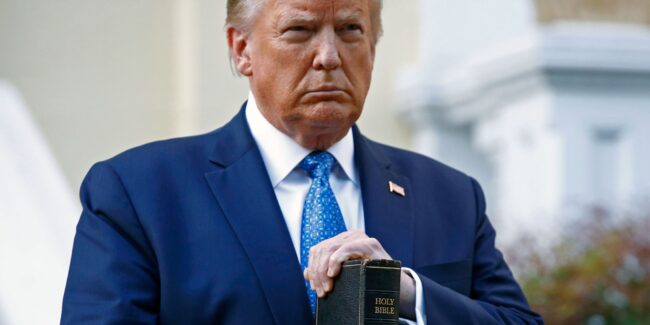
His Hair and Our Beards: Trump, a Global Leadership Crisis and our Children
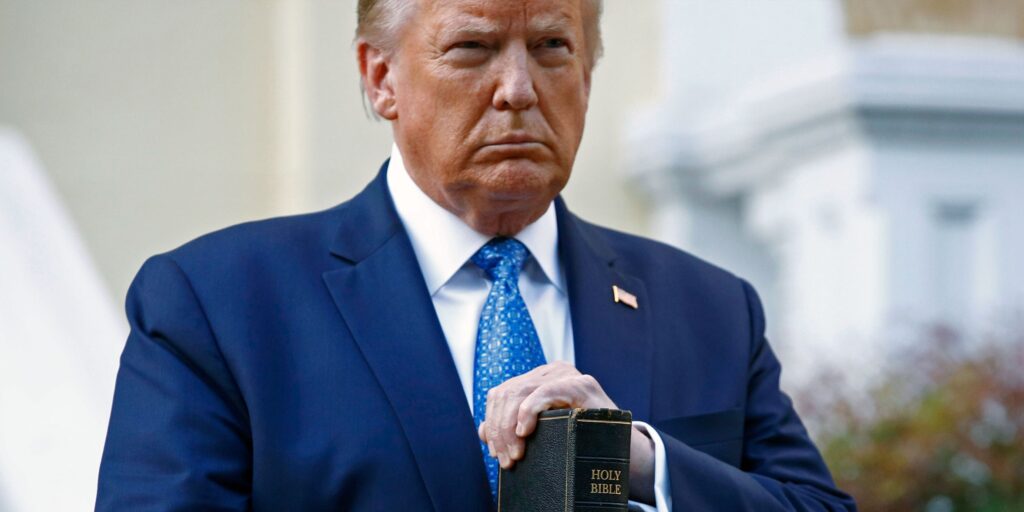
President Trump propping up a book that could flip his life and leadership if he would read and apply it. Same is true for us all! (Photo credit: The New Yorker)
“Stopping Trump is a short-term solution. The long-term solution, and it will be more difficult, is fixing the educational system that has created so many people ignorant enough to vote for Trump.” (Andy Borowitz, a satirist)
Let me begin with a disclaimer: I do not subscribe to the notion that everyone who voted for Trump is ignorant. That would be an unfair characterization. Politics is more nuanced than that. I say there are at least 3 Ps that go into one’s choice, none of which is perfect in any political party and hardly are all three aligned with what is Biblical: the PERSON (as in flag bearer), the PARTY and the POLICIES.
Having said that, how did the most powerful nation in the world end up with such a leadership crisis? I’m not just talking about the nail-biting U.S. electoral college vote count last week and the current situation where a winner has been projected but the incumbent hasn’t gathered what it takes to concede and congratulate. I speak of four years ago when America had to choose between two wannabe leaders of the free world both of whom the electorate had serious reservations about! America was caught between the red devil and the deep blue sea.
And the last four years have portrayed nearly everything I’ve been taught that leadership is NOT exhibited by the man in the White House. Is it competence in inspiring confidence about the Coronavirus pandemic and quenching it or a character of what is good and right and true or care and respect for ‘the other’? Competence, character and care constitute the DNA of leadership. Of course Trump did do some good things. I have even admired his non-political-correctness and tough skin in forging ahead buoyed by the courage of his convictions (no matter how misinformed I think they might be sometimes). By and large, however, I have had to repeatedly tell my children too many things about Trump that leadership is NOT.
THE VAN JONES MOMENT
When I saw Van Jones weep on television that as a parent the defeat of Trump and the elevation of Biden is a testament to the fact that character matters in life and leadership, I very much identified with that. Character matters. Truth matters. Decency matters. And one would think the white evangelical church in America would know better than a journalist.
If the one country that has produced the most world-impacting heads of states, Nobel laureates (390 of them; the UK which is next is at 135), stellar entertainers and astounding professional athletes could face such a gaping leadership crisis then the rest of the world had better watch out. In my Twi language from Ghana, there is a saying that when you see your neighbor’s beard on fire, you had better quickly fetch a bucket of water and place it beside yours (well, hopefully after you’ve helped him doust his!)
OF SHITTY STORIES & SHIT HOLE COUNTRIES
The S word is one that isn’t in my vocabulary. Permit me to get into the gutters in this little stretch so we both appreciate the abyss leadership sunk into these last four years. When Trump was elected I was hopeful. My family’s explanation to a United States border agent that we were crossing over from Canada to upstate New York to check on our investment property had been described by this kid in the border cage as “Such a Shitty Story.” When I wrote about that in January 2017, I was hopeful that a Trump presidency would catalyze the noble dreams Martin Luther King Jnr. had for his four little children (and my six) and not turn into the nightmare many feared. The latter has happened. Blacks still can’t breathe in 2020, George Floyd’s slow slaughter being the epitome of that.
As one born and raised in Africa I have long experienced firsthand that “everything rises and falls on leadership.” Whether as a young medical doctor in Ghana seeing patients die who shouldn’t have or as a United Nations peacekeeping soldier in Cote d’Ivoire beholding with my own naked eyes the ravages of war, there is no other one word that summarizes all that’s wrong with my continent as ‘leadership.’ The sad socioeconomic state in the midst of abundance earned us the disparaging title of “Shit hole countries” by President Donald Trump who ironically has gone ahead to look, sound and act in the very manner people who have misled, unled, disled Africa have.
START EARLY
Leadership is a sacred trust. Twenty years ago I was so concerned that leadership knowledge and mindset, character and skills be acquired early that I co-founded The HuD Group to intervene at the youth level and change the African narrative. Nearly 20 years later I am still convinced that leadership development and training must start early but even earlier: with children. And it begins by calling them “cubs” who will grow into lions and not “kids” who will grow into billy goats gruff (or the trolls in that fairy tale, for that matter LOL).
While at my executive education company that bears my name, YAW PERBI, we’re intervening at the C-Level, Perbi Cubs Library Services is beginning from the very roots: with children and from our homes and schools. I’ll tell you why we launched the Lions In Training (LIT) Track at Perbi Cubs only a couple of weeks ago (although we’ve been dreaming about this for a long long time).
WHY LIT?
LIT is the collective attempt of Perbi Cubs and parents who are preparing the next generation to meet the great challenges and opportunities of the twenty-first century and thrive! The LIT track is to help groom our Cubs into holistic Leaders (Lions). The Perbi Cubs reading community knows that the future of our reading Cubs is promising because of the world of opportunities opened to them every day as they open books to read. For sure, readers are leaders.
Reading, however, is necessary but not sufficient.In this light, Perbi Cubs desires to partner parents to nurture Cubs in relevant soft skills that will take them places and form them into young well-rounded leaders of great impact. Research shows that a leader is developed over the entire course of their life: from womb to tomb. It is never too late to start teaching, learning and applying leadership skills to everyday life.
Next, I’ll show you HOW we’re going about it. For now remember, Trump’s orange hair is on fire; we all had better get a bucketload of godly, effectual leadership to sit by our beards!
*NB: YAW PERBI serves as consultant, coach and trainer for Perbi Cubs and is not involved in the day to day management of this groundbreaking social enterprise. If you require YAW PERBI’s assistance in executive coaching, management consulting or leadership training reach out to yawperbi@gmail.com.
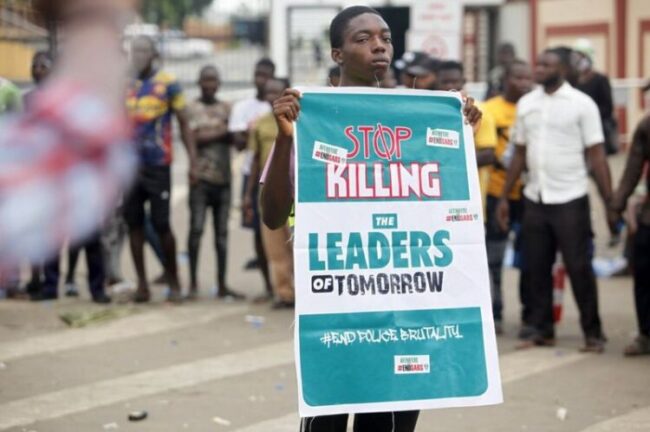
Youth Power!
Sixteen years ago I subtitled my ‘Youth Power!’ book, “unleashing the potential of the most powerful people on earth.” This pandemic year is giving us ample proof.

Nigerian youth at the #EndSARS protests. Youth are leaders of today; not just tomorrow. Photo credit: EPA
The recent George Floyd protests in the United States of America and around the world and current #EndSARS campaign in Nigeria against notorious police brutality have reignited my convictions about Youth Power!, well-documented in a 2004 book by that title. “This [#EndSARS] protest has been largely driven by young people,” I just heard from a CNN report.
YouthPower! is a revolutionary paradigm which seeks to start a fire in Young People for them to get their act together and do something significant with their lives…Now! For the last 16 years I have “been preoccupied with looking for evidence of Youth Power! all over the world and in all spheres of human endeavour since introducing that paradigm-shifting concept” in the mid 2,000s. Some other books that I have written to document such stories have included 15 Inspiring Young People and 15 Successful Global Businesses Young People Built, from Amazon to Time magazine.
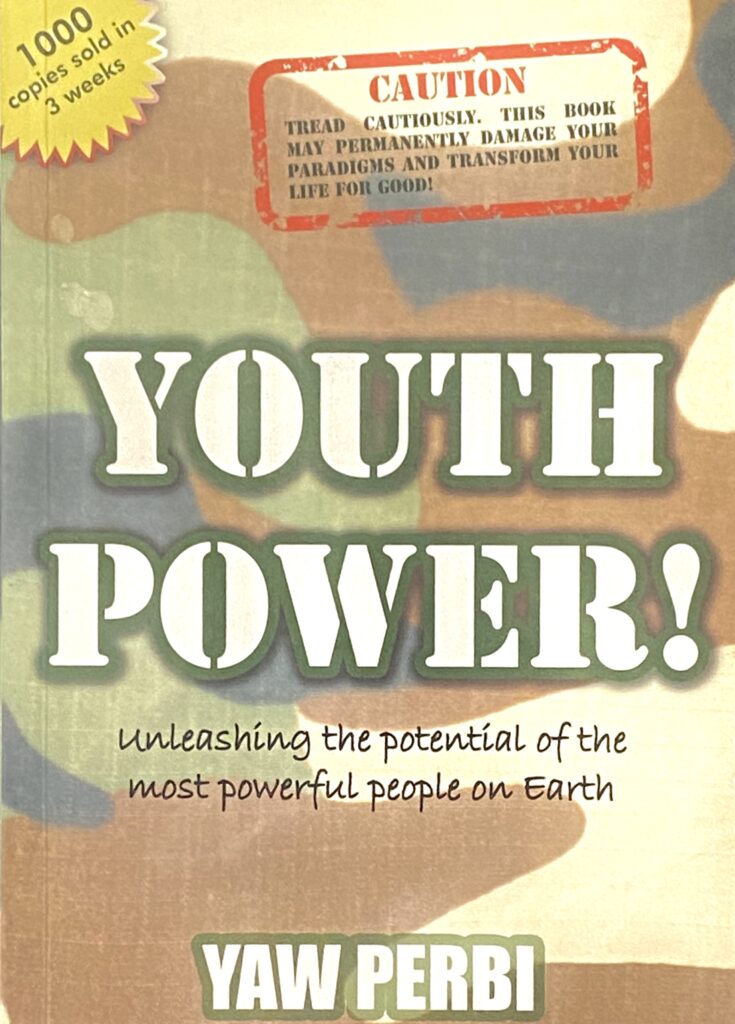
The 2004 publication YouthPower! had a foreword by Dr. Mensa Otabil
Young people have a lot going for them; youth have a lot of power! First, the numbers–there are more young people on earth than ever before in the history of the world! And that is power. But wait, there’s more. Young people have influence, the ability to control people and situations–even holding governments to ransom. That is power. Young people have incredible talents and special abilities which peak at this time of their lives. We have seen how they have utilized their tech savviness and power of mobilization to literally get the government of Nigeria to dissolve the said Special Anti-Robbery Squad (SARS) they’re protesting against on 11th October 2020. Shall we talk about the sheer passion, strength and energy of youth? Throughout the history of the world, young people have touched, shaped and shaken the world in politics, academics, business, sports, arts/entertainment etc.
More often than not, though, all this power is stored in the form of potential. The rest of the book Youth Power! is full of keys to unlocking all this power in terms of principles, the proto principle, purpose, planning, preparation, people, places, practices, pruning puny behaviours and ultimately how all of this results in pay.
YOUTH POWER! IN AFRICA
In 2005, the year after Youth Power! was published and widely distributed in Ghana, I was on a break in South Africa, after failing my final year medical school exams in Surgery. A pilgrimage to Soweto inspired me to write “a historical and tourist account of how Youth Power! that broke the back of apartheid in South Africa.” That sequel is entitled “Youth Power! in Soweto.” For the whole year I served as a doctor-captain with the United Nations Operations in Cote d’Ivoire, it was my joy and pleasure to walk scores of Ivorian Young People at the Université de Bouaké through the paradigm and practice of Youth Power! They even run a contest, translating the book into French.
Today’s protests remind me of the eternal words of one of the young student protestors back in apartheid South Africa in the late 1970s. You can see those words becoming flesh in today’s young protestors also, from Washington to Lagos:
“Our parents are prepared to suffer under the white man’s rule [or any form of injustice and brutality for that matter]. They have been living for years under here laws and they have become immune to them. But we strongly refuse to swallow an education [or whatever] that is designed to make us slaves in the country of our birth.”
As I participate in hash tagging, donating and encouraging the strong network of The HuD Group (publishers of the original Youth Power!) in Nigeria and around the continent of Africa to keep pressing for positive change, I look forward to adding to the thick annals of Youth Power!, yet another sequel: the contemporary history of Youth Power! in Nigeria.
COVIDic Times: PLAYING GOD.
The time of the prophet Isaiah, in the eighth century BC, was a similar period of turmoil and change in the Near East just as the COVID-19 pandemic has rendered our world today. The people of God had a choice to make between the multitudes of tangible but false gods of the neighbouring states and the unseen but Almighty God of their forebears. We face a similar choice in a similar dispensation. Who/What will we trust in for salvation?

Image of SARS-CoV-2, the novel Coronavirus wrecking havoc in our world today (image credit: Kingston Police)
INTRODUCTION
What a time to be alive! Our ‘Titanic’ has hit an iceberg. The worst pandemic in 100 years! Over half a million infected with COVID-19 in 199 countries and territories; over 25,000 dead. Nations are in lockdown; economies are heading into recession; healthcare systems are bursting at the seams… everything that can be shaken is being shaken!
The time of the prophet Isaiah, in the eighth century BC, was a similar period of turmoil and change in the Near East (Coogan 2016, 253). It wasn’t a viral microorganism stirring up the turmoil; it was a viral kingdom called Assyria! As Coogan puts it, “As the Assyrians moved toward Egypt in their ambition to control the entire Near East, the northern kingdom of Israel, like many other states in the region, was absorbed into the Assyrian empire, and the independence of the southern kingdom of Judah was curtailed severely” (253).
The other thing was that the Near East was rife with idols! Literally thousands of idols have been uncovered by archaeologists throughout the area. And Israel was constantly tempted to put their trust in these tangible but false gods rather than the unseen yet Almighty One. This is the context of the prophet Isaiah.
In the last couple of weeks my church family in Montreal, Westview Bible Church, began a series on “Selections from the Book of Isaiah” under the broad theme “The Glory of God and the Restoration of all things.” Today we continue that, and for the next few weeks… The book of Isaiah’s overall theme receives its clearest purpose statement in chapter 12: “Behold, God is my salvation, I will trust and not be afraid” (Isaiah 12:2). This echoes the meaning of Isaiah’s name, which means the “Yahweh is salvation.”
Today’s message, PLAYING GOD, samples a number of passages in the Second of three parts of Isaiah, chapters 40-55, particularly chapters 40, 42, 44 and 45. My aim is to force us to take a closer look at our tumultuous world today (just like in Isaiah’s day), to see how everything that can be shaken is shaking right now. And to ask ourselves a piercing question: What shakey created thing are we putting ahead of, or even in place of, an unshakeable uncreated God? Who or what has been playing God in your life? How are they doing right now? Isaiah 42:6-22 will be our anchor text; but we’ll go back and forth in the Isaiah 40’s. Let’s go!
OUTLINE
Playing God. There’s a sense in which we play God because we are made in His image and likeness and have the power to create, both hard ‘stuff’ and soft stuff like ideologies. But as Andy Crouch puts it so well, “Idolatry is the biblical name for the human capacity for creative power run amok” (Crouch 2013, 55). We then create stuff that now want to play God in our lives. We make idols and then they shape us!
We’ll examining this message in four parts (4C’s):
-
- Characterization | characterization of idolatry (Isaiah 44:1,2, 6-7, 9)
- Claims | claims of the gods (Isaiah 44:1,2, 6-17)
- Consequences | consequences of idolatry (Isaiah 44:10, 11, 18-20)
- Call, your call. (Isaiah 44:19-22)
1. CHARACTERIZATION | of Idolatry (44:1, 2, 6-7, 9)
Right from the beginning of Second Isaiah onwards (chapter 40 forwards) there is a series of verses targeting idols and idolatry, especially chapters 40 to 48. Introduction is right there in chapter 40:18
18 With whom, then, will you compare God? To what image will you liken him? 19 As for an idol, a metalworker casts it, and a goldsmith overlays it with gold and fashions silver chains for it. 20 A person too poor to present such an offering selects wood that will not rot; they look for a skilled worker to set up an idol that will not topple.
Images in the ancient Near East were either cast (i.e. metal) or carved (out of wood). An idol is a cultural construct, hard or soft, that we treasure and that embodies a false claim about our ultimate source, sustenance and sense of identity and meaning. “The word ultimate is crucial …” (Crouch) because various things are our source( eg. the sun for light) and sustain us (eg. economy or science) and give a sense of meaning (like family) but none of them should ever be considered ULTIMATE! Then they become a god; a false god.
It is reported that someone said of the Titanic: “Even God cannot sink this ship!” That is the problem with idolatry. Crouch says Crouch, “an idol is a special kind of human creation, one that is not just mistaken in a superficial way. Rather, it advances a claim about the ultimate nature of reality that is ultimately mistaken. And since the Creator God is the ultimate meaning of the world, an idol is a representation of a false god. Implicitly or explicitly, all idols represent a challenge and counterclaim to the identity and character of the true Creator God.”
First of all, who are the PLAYERS in this ‘game of thrones’:
- Yahweh: “Israel’s King and Redeemer, the Lord Almighty” (vs. 6)
- If you back track to the beginning of the chapter (vs. 2), “This is what the LORD says…”
- Yahweh’s people: they are the ones he’s mainly speaking to in this passage
- Backtrack to beginning of chapter (vs. 1): “But now listen, Jacob, my servant, Israel,
- Repeats “Jacob, my servant” in the last part of verse 2 and adds a nickname for them “Jeshurun.” This was “an endearing name for Israel—see Deut 32:15; 33:5, 26” (Walton et al 2000, 628).
- Verse 7 talks about “what has happened since I established my ancient people“
- In vs. 8b, “you are my witnesses“
- Idol makers/Craftsmen: “All who make idols…” (vs. 9a)
- Idols: “…and the things they treasure…” (vs. 9b)
2. CLAIMS | of the gods (44:1, 2, 6-17)
GAME ON!!! Idols’ claim versus Yahweh’s claim. Both Yahweh and idols want to claim us; but only God is able to articulate and justify his claim in the Scripture! In fact, an idol can make no claim, except what we’ve attributed to it. God wants to play His role as God in our lives; but idols also want to play God. I’ll just compare the claims in terms of CHOICE, CREATION, CLASS, CONFESSION of these four players.
A. Choice | The One Who Has First Choice alone is worthy of first place!
- YAHWEH: He chooses first because he comes before all things!
- “But now listen, Jacob, my servant, Israel, whom I have chosen.” (vs. 1)
- “Do not be afraid Jacob, my servant, Jeshurun, whom I have chosen.” (vs. 2)
- PEOPLE & IDOL MAKERS: They go choose a what deity, design and material in nature.
- “A person too poor to present such an offering selects wood that will not rot; they look for a skilled worker to set up an idol that will not topple.” (Is. 40:20)
- IDOL: Cannot choose anything or anyone.
B. Creation | The One Who Creates alone is worthy of worship!
- YAHWEH: “This is what the Lord says—he who made you, who formed you in the womb, and who will help you…” (vs.2). “I have made you, you are my servant” (vs. 21) 18 For this is what the Lord says—he who created the heavens, he is God; he who fashioned and made the earth, he founded it; he did not create it to be empty, but formed it to be inhabited…” (Isaiah 45:18)
- PEOPLE & IDOL MAKERS: “Who shapes a god and casts an idol,which can profit nothing?” (vs.10) “People who do that will be put to shame; such craftsmen are only human beings.” (v.11)
- 12The blacksmith takes a tooland works with it in the coals; he shapes an idol with hammers, he forges it with the might of his arm. He gets hungry and loses his strength; he drinks no water and grows faint. 13 The carpenter measures with a line and makes an outline with a marker; he roughs it out with chisels and marks it with compasses. He shapes it in human form, human form in all its glory, that it may dwell in a shrine. 14 He cut down cedars, or perhaps took a cypress or oak. He let it grow among the trees of the forest, or planted a pine, and the rain made it grow.15 It is used as fuel for burning; some of it he takes and warms himself, he kindles a fire and bakes bread. But he also fashions a god and worships it; he makes an idol and bows down to it. (vs. 12-15)
- IDOL: Is created/shaped! “Who shapes a god and casts an idol, which can profit nothing?” (vs. 10)
C. Class | God is in a class of His own; all by Himself. He is worthy of our exaltation.
- YAHWEH: “This is what the Lordsays—Israel’s King and Redeemer, the Lord Almighty: I am the first and I am the last; apart from me there is no God. Is there any God besides me? No, there is no other Rock; I know not one” (vs. 6) In Isaiah 45: 18 God says: “I am the Lord, and there is no other.”
- PEOPLE: “Those who would speak up for them are blind; they are ignorant, to their own shame” (vs. 9c).
- IDOL MAKERS: “All who make idols are nothing…” (vs. 9a)
- IDOLS: “…and the things they treasure are worthless.” (vs. 9b)
- 16 Half of the wood he burns in the fire; over it he prepares his meal, he roasts his meat and eats his fill. He also warms himself and says,“Ah! I am warm; I see the fire.” 17 From the rest he makes a god, his idol; he bows down to it and worships. He prays to it and says, “Save me! You are my god!” (vs. 16-17)
D. Confession | The One Who Can Speak for Himself (not spoken for) is to be heeded.
- YAHWEH: Who then is like me? Let him proclaim Let him declare and lay out before me what has happened [past] since I established my ancient people, and what is yet to come—yes, let them foretell what will come [future].” (vs. 7) “Do not tremble, do not be afraid. Did I not proclaim this and foretell it long ago? You are my witnesses.” (vs. 8) “I have not spoken in secret, from somewhere in a land of darkness;I have not said to Jacob’s descendants, ‘Seek me in vain.’ I, the Lord, speak the truth; I declare what is right.” (Isaiah 45:19)
- PEOPLE: Nothing to say.
- IDOL MAKERS: Nothing to say.
- IDOLS: Say nothing. They do not because they cannot.
3. CONSEQUENCES | of Idolatry (44:10, 11, 18-20)
When it comes to idolatry, it’s a lost game. Heads, you lose; tails you lose.
- A. Lose Time & Money: Who shapes a god and casts an idol, which can profit nothing? (vs. 10)
- B. Lose Honour/Face: “People who do that will be put to shame; … Let them all come together and take their stand; they will be brought down to … shame“ (vs. 11). But those who trust in idols, who say to images, ‘You are our gods,’ will be turned back in utter shame. (Isaiah 42:17) “All the makers of idols will be put to shame and disgraced; they will go off into disgrace But Israel will be saved by the Lord with an everlasting salvation; you will never be put to shame or disgraced, to ages everlasting.” (Isaiah 45:16-17)
- Nana Bea story of idol in rain; beaten to pulp
- C. Lose Calm: “… they will be brought down to terror ….” (vs.11). Terror.
- D. Lose Sense/Smartness:“They know nothing, they understand nothing; their eyes are plastered over so they cannot see… No one stops to think, no one has the knowledge or understanding to say, “Half of it I used for fuel; I even baked bread over its coals, I roasted meat and I ate. Shall I make a detestable thing from what is left? Shall I bow down to a block of wood?” Such a person feeds on ashes; a deluded heart misleads him; he cannot save himself, or say, “Is not this thing in my right hand a lie?” (Isaiah 44:18-20)
- We’re not even able to record at church anymore, hence this message is from my home office—which incidentally used to be a shrine for a number of idols. When we came to see this home in Pierrefonds to purchase it a little over seven years ago, this room was full of idols! Think about it, the former occupants of this house had to pack up what they worship in boxes and send them to their next house. How can something you can pack up and carry, carry you?! We lose our smarts!
- E. Lose Self (GOD IMAGE): BECOME LIKE THEM! Blind, deaf, dumb; heartless… “Those who make them will be like them, and so will all who trust in them.” (Psalm 115:8). You become who/what you worship.
Bottomline, you loose all. I like how Andy Crouch puts it: “All idols begin by offering great things for a very small price. All idols then fail, more and more consistently, to deliver on their original promises, while ratcheting up their demands, which initially seem so reasonable, for worship and sacrifice. In the end they fail completely, even as they make categorical demands. …idols ask for more and more, while giving less and less, until eventually they demand everything and give nothing” (56).
4. CALL | your call (44:19-22)
Today, God is calling us to Reflect, Remember, Repent and Return.
A. REFLECT (stop to think): “No one stops to think, no one has the knowledge or understanding to say, “Half of it I used for fuel; I even baked bread over its coals, I roasted meat and I ate. Shall I make a detestable thing from what is left? Shall I bow down to a block of wood?” 20 Such a person feeds on ashes; a deluded heart misleads him; he cannot save himself, or say, “Is not this thing in my right hand a lie?” (vs. 19-20)
-
- Reflect (take stock) of what you A-D-O-R-E
- Who/What you ADORE –> affections
- gods out of celebrities (catching the virus); Sports (NBA has ceased; Olympics postponed)
- Who/What you DEPEND ON –> addictions
- gods out of our sexuality; gods out of science & technology; AI’s coming!
- Who/What you OBEY –> directions
- gods out of our autonomy, our intellect! Our appetites. “The god is their stomach”
- Who/What you spend significant RESOURCES on –> investments of time and money.
- gods out of business; our economies; our healthcare system
- Who/What you Elevate –> promotions
- gods out of human rights—“We’ve elevated our rights above the one who makes us righteous” (Ron Kenoly).
- All these things, are good servants but terrible masters!
- Who/What you ADORE –> affections
- Reflect (take stock) of what you A-D-O-R-E
B. REMEMBER: “Remember these things, Jacob, for you, Israel, are my servant. I have made you, you are my servant; Israel, I will not forget you.” (vs. 21)
C. REPENT: “I have swept away your offenses like a cloud, your sins like the morning mist.” (vs.22a)
D. RETURN: “Return to me, for I have redeemed you.” (vs. 22b)
CONCLUSION
GOD DOESN’T PLAY. HE IS GOD. He is either NUMBER ONE or NUMBER ONE! He won’t take second place. “I am the Lord; that is my name! I will not yield my glory to another or my praise to idols.” (Isaiah 42:8)
IF you have an idol in your life, it is your full responsibility because you have ceded your power of creation and choice as a person made in the image of God with the ability to ‘play God’ to someone or something, hard or soft, to rather play God in your life.
We’re so nothing—but you know what’s worse—the things we create to PLAY GOD in our lives. Everything that is created—primary (i.e. created by God) or secondary (created by man from what has already been created by God)—can be shaken.
Let me ask you again: What shakey created thing—created by God or man—are you putting ahead of, or even in place of, an unshakeable uncreated God? Crouch says, “Like the serpent in the Garden, they all [i.e. all idols] raise the question of the Creator God’s truthfulness and goodness, subtly or directly suggesting that the Creator God is neither true nor good” (56).
But in times of crisis like now I hope you see how no one and no thing can save you but Yahweh! “Behold, God is my salvation, I will trust and not be afraid” (Isaiah 12:2). All else you cannot trust for salvation; and you ought to be afraid! NOTHING WE MAKE OF OURSELVES OR MAKE OURSELVES CAN ULTIMATELY SAVE US! Do you want to be safe and saved? Come to Yahweh!
References
Coogan, Michael D. 2016. A Brief Introduction to the Old Testament. The Hebrew Bible in its Context. New York, NY: Oxford University Press.
Crouch, Andy. 2013. Playing God: Redeeming the Gift of Power. Downers Grove, IL: InterVarsity Press.
Holy Bible, New International Version®, NIV® Copyright ©1973, 1978, 1984, 2011 by Biblica, Inc.® Used by permission. All rights reserved worldwide.
Walton John H., Victor H. Matthews and Mark W. Chavalas. The IVP Bible Background Commentary. Old Testament. Downers Grove, IL: InterVarsity Press.
__________
This was preached as a Sunday morning online service of Westview Bible Church on March 29, 2020. Video version available here.
COVIDic Times: A WAKE-UP CALL.
By
Dr. Owusu Banahene
At a time when for once leaders of a developing country cannot escape the infrastructure and systems they might’ve failed to build to benefit from someone else’s in the developed world, this presents a fine opportunity to experience the harsh reality for themselves and sit up, post COVID-19. A pandemic is a terrible thing to waste.

An already overstretched Ghanaian hospital pre-COVIDic times (Photo Credit: Prime News Ghana)
I would like to add my voice to concerns that some have have expressed recently about lessons that Ghana should draw from the coronavirus pandemic. This is crunch time for us. It is a wake-up call. There is no doubt that the health system in Ghana would not cope if we were to be faced with even a quarter of the cases that we have seen in countries like China, South Korea, Iran, Italy and Spain, to name but a few. Even Italy, with one of the best health systems in the world, cannot cope. The UK has adopted drastic measures because it recognises that its National Health System cannot handle the expected cases. Equally, the USA does not have enough test kits, ventilators, hospital beds, doctors, nurses etc. to manage the numbers expected.
Ghana’s health system is nowhere close to these countries. Even under normal circumstances, our public hospitals have low capacity—we struggle with shortage of beds, with many patients sleeping on the floor or in corridors. We cannot even deal with Malaria nor vaccines without going cup in hand to the Global Fund and GAVI. Yet, our politicians and governments over the decades have lived and continue to live in largesse. For example, for a small, debt-ridden, low middle income country like Ghana, we have well over 100 ministers, most of whom live in expensive houses in posh neighborhoods provided by the state and drive expensive cars (so-called V8s). Their favourite car, the Land Cruiser, costs about USD 135,000 to buy new. All of these ministers have two or more cars provided by the state.
It is not just ministers. I have seen parliamentary delegations travelling abroad, sometimes about 15 of them. They travel in Business Class. When you engage them in conversation, they tell you about some of their other trips to places like South Africa, the UK, Kenya etc. One gets the impression that they travel frequently and regularly. They get significant per diems on these trips and stay in expensive 4-star and 5-star hotels. I recall one such delegation on a trip to the UK, made up of MPs from the ruling party at the time and the opposition, not to mention their escorts. Most were in First Class, whilst the rest (the escorts) were in Business. Upon arrival at London Heathrow, there was a fleet of Mercedes cars on the tarmac from the Ghana High Commission to meet and collect them. Of course they did not go through immigration and customs like the rest of us did.
Add to the above the corruption and kick-backs from contracts and other rent-seeking activities and you get an idea of the scale of the loot and largesse. In consequence, infrastructure projects such as airports, roads, hospitals, electricity etc. cost twice or more what they should, to say nothing of procurement of routine and regular supplies across the country. These monies, amounting to hundreds of millions of US dollars, end up in the pockets of the politicians, public servants and their cronies.
I could go on, but now, consider what we could have done with such monies at a time like this with COVID-19. Consider the test kits we could have bought, the hospitals we could have built across the country, the isolation wards, the ventilators we could have procured, the number of doctors, nurses and other health personnel we could have trained and retained in Ghana—with all the extravagant spending, waste and corruption of the past three or four decades! We could have been like Singapore or South Korea but, no, our politicians, public servants and their cronies have chopped and wasted the money—and continue to do so.
I hope and pray that COVID-19 would be a wake-up call for all of us. I wish some smart Alec would identify and do an inventory of all the properties and monies, including those stashed abroad, of the politicians and public servants and ask them to account for them. Those that cannot be legitimately accounted for should be confiscated and auctioned, with those monies going into a special fund for development. It is crunch time. It is time for us to wake up!
_______________
COVIDic Times: Don’t Pitch Faith and Science Against Each Other!
It’s never a good time to pitch religion and reason against each other but certainly not in a time of crisis, especially the kind of COVID-19 pandemic which requires “all [washed] hands on deck!”
Much of my time this morning was spent going back and forth debating on my Achimota School 1995 WhatasApp platform because one member forwarded what was purported to be a Tweet from a prominent Ghanaian journalist: “A country that invests in a $100 million cathedral, and not in medical research, can only pray in times of a global pandemic and hope to profit from the labs of countries that invest in science and technology.”
BLOW AWAY THE CHAFF
The last thing we want to be doing at this time is to pitch faith and science against each other, but before delving into that let me first quickly get rid of the disingenuity of the above statement which seems smart, even sassy, at face value. 1. The $100 million (if that is even accurate) is being raised by a Ghanaian Christian community that for the last 200 years has invested heavily not only in the faith of the Ghanaian people but in agriculture, schools, hospitals (including these supposed medical research centres) and the like. The government of Ghana isn’t raising the money for the cathedral–they gifted the land and seed money as their contribution but the body of Christ in the nation is doing the rest. 2. As I’ve stated elsewhere, nation building is complex: “We are building a nation here, a cohesive entity that must have spirit; not just a conglomeration of social services!” 3. Many of these countries that are being touted today as having ‘rather’ invested in science and technology have a rich faith heritage and foundation, including national cathedrals, that was part of the tide that raised them to where there are. Today they are becoming so secular to the point of amnesia! They ought to remember the rock from which they were hewn! 4. Throwing in a thorny issue at a time of national and global crises when the last thing we need is polarization is just not on; quite insensitive, actually. 5. To say one “can only pray in times of a global pandemic” is not only condescending and treating faith with disdain but unnecessarily pitting it against reason, faith and STEM. The last point is what I want to dwell on for the rest of this blog.
DOUBLE POWER
My immediate response to the said journalist’s statement is: The opposite is true also. A country that does not invest in the spiritual wherewithal of her people can only rely on science and technology, which evidently aren’t enough in the face of monstrous situations like the COVID-19 epidemic! Today, amidst the Coronavirus pandemic, doctors and scientists are using words like “hope,” “faith” and “pray.” Prayer is powerful; ask how I know!
Perhaps I’m in a unique position to speak to this issue as I am a medical doctor myself and a preacher. Double power! I prescribe medication but I also pray for people. Double power! The secular humanists only has science/technology; I have faith and science/technology. Double power! Why would anyone want to use only the right or left brain; one hand/leg instead of both (if they have them)? Why would any bird want to attempt to fly with only one wing? Why pitch faith against science when the same Lord God made both and wants everything in us and His world to be used for His glory? Double power, friends! That’s why I like the painting above that admonishes us to “wash and pray.” “Faith without works is dead,” said the apostle James. As my reverend minister likes to say, “Trust in God and lock your car.” God does miracles (the supernatural) on occasion and has also given us a bunch of principles for daily (natural) living.
Check out the double power response of Martin Luther (the Reformer) to one Rev. Dr. John Hess in a letter “whether one may flee from a Deadly Plague.”
FALSE DICHOTOMY
I have watched with amusement as various world leaders respond to the COVID-19 crisis. Again, I may be in a unique position in experiencing both ends of the spectrum as a Ghanaian (largely religious) and Canadian (largely secular). Within the same 24 hours, the Canadian Prime Minister (whose wife has tested positive and who is himself in isolation) made a broadcast admitting he was as flustered as everyone else but generously offering practical measures to curb the debacle, the Ghanaian president called a number of church denominational leaders to the seat of government (Jubilee House) to pray! I am one of the 13,000 who joined in that prayer meeting via FaceBook Live and I loved his opening remarks. He said (to paraphrase), yes we have put health measures, travel advisories, financial resources etc. in place but we need more–to call on the God of Heaven as other leaders and nations have done throughout history and even now (we know the United States presidency also called for a national day of prayer on Sunday March 15). The Ghanaian president’s kind is an endangered species, one of few in the modern world who do not separate the physical and spiritual realms.
Consider Myers’ table above. How did we get here, to a place where the modern worldview is so dichotomous?! Pitching faith and reason against each other goes back centuries, perhaps peaking during the Enlightenment (17th to 19th century) in Europe. Yet we forget that Newton, Kelvin, Faraday and a host of other scientists were people of faith, specifically of the Christian faith. Does one’s faith make them a better or worse scientist? Of course not all scientists have faith–such is the beauty of the free will of humankind.
CONCLUSION
Faith leaders, this is not a time to be playing down rigorous reasoning and true science (for o yes, there is such a thing as pseudoscience) and flouting the basic public health protocols provided. Secular leaders, this is not the moment to look down on people of faith–who knows, their prayers may be keeping you alive!
I am right-handed but would hate to be only one-handed! I am a person of faith and reason, science and religion. I admit that Truth tends to be paradoxical and managing the tension between two ends isn’t a comfortable place to be but I’d rather fly with both wings than attempt to soar on one alone–impossible! Again, let’s not fall for the tyranny of the ‘or’ but embrace the genius of the ‘and’ (Jim Collins). Wash your hands and clean your hearts. Social distancing doesn’t imply spiritual distancing. Pray hard as if everything depended on God (it really does!) and work hard (especially those of us on the medical frontlines as well as in the background slaving away in labs trying to make vaccines) as if everything depended on you (humanly speaking, it does).
In many things, our world is polarized: female versus male, poor versus rich, secular versus sacred, spiritual versus material, church versus state, private versus public, evangelism versus social action… Please let’s not add science versus faith, especially in this time of crisis!
Reference
Myers, Bryant L. 2011. Walking With the Poor: Principles and Practices of Transformational Development. Maryknoll, NY: Orbis Books.
Church in a Century of COVIDic Captivity | Epistle 1
The Coronavirus pandemic has changed everything; including ‘church.’ As one who loves the Church and studies her, I hope to capture my (and others) random thoughts about the Church here at a time when COVID-19 threatens to hold us all to ransom.
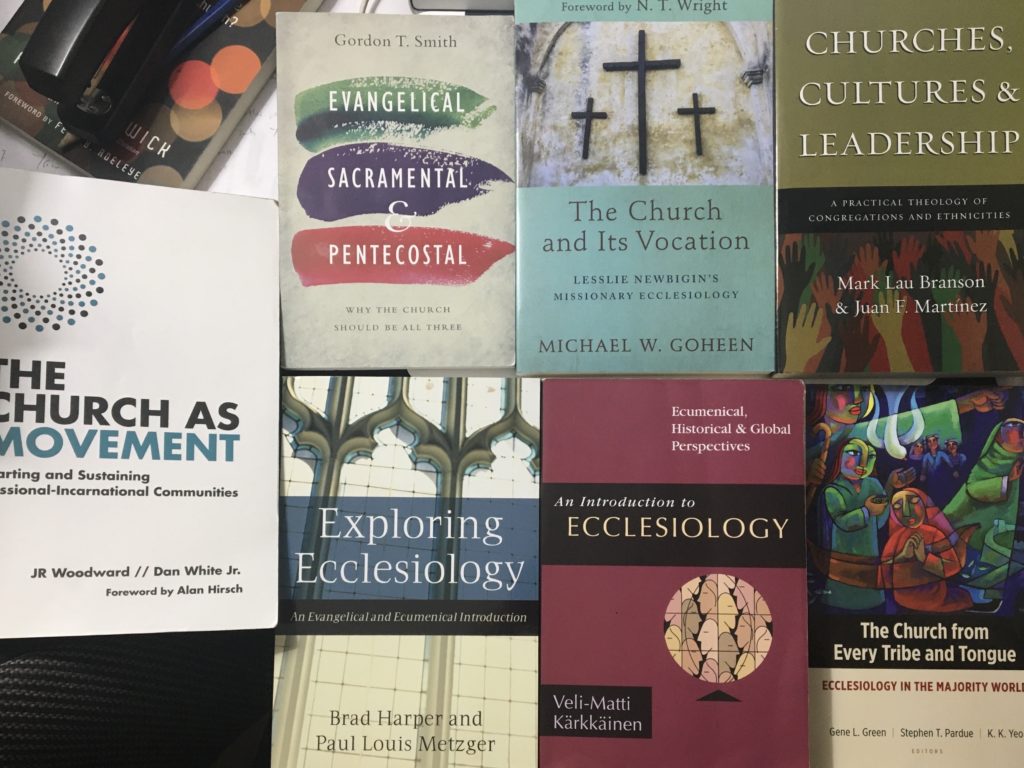
A few of my library books on ecclesiology (the part of theology that undertakes the study of the Church)
1. CHURCH IS PEOPLE FIRST
Some have been upset by various governments prohibiting the gathering of people, including churches, during this COVID-19 pandemic. In trying to make a point regarding what is the most important thing about church, I have seen well-meaning Christians ask on social media: “is church a place we go or what we do?” I’ve had to gently nudge some to say it’s both; and neither. Because church is first and foremost who we are. Church is people first, before it is what they do (‘doing church services’) or a place they go (‘going to a church meeting place/building’).
To all who believe in Jesus Christ as their saviour from their sins and accept him, God gives the right to become children of God (John 1:12). These persons become engrafted into Jesus, forming ‘the body of Christ’. “All of you together are Christ’s body,” Paul writes to the church in the commercial city of Corinth in ancient Greece, “and each of you is a part of it” (1 Corinthians 12:27). These believers in Christ and now the body of Christ are also called “the household of God, which is the church of the living God” (1 Timothy 3:15, ESV).
These people may gather at a particular place (which over the centuries has become known also as ‘church’) and conduct a ceremony (which has become known as ‘doing church’ too) but church is first and foremost God’s people in Christ, before it is where they go or what they do.
So ask yourself if even you’ve been ‘going to church’ and/or ‘doing church’: are you really church? “… God’s truth stands firm like a foundation stone with this inscription: “The LORD knows those who are his,” and “All who belong to the LORD must turn away from evil” (2 Timothy 2:19). A symbolic way the Bible puts turning away from our sins and evil is ‘washing your hands and purifying your heart’ (Psalm 24:4). Perhaps as you physically wash your hands in this season you might want to consider inviting Jesus to wash your heart with his shed blood on the cross as well so you become church; and not just go to or do church?
2. CHURCH SO SIMPLE YET SO COMPLEX
Precisely because church is people and people are diverse and complex, what should’ve been the simple definition of church in the point above, has evolved in complexity! As Karkkainen bluntly puts it, “the term church for better or worse reasons has been loaded wth so many unfortunate connotations from authoritarianism to coercion to antiquarianism.” Almost anything anybody says about ‘church’ can be true because there is such a wide range: the good, the bad and the ugly. All those books in the picture above (and I have more) are my feeble attempt to learn more and more about the church.
So, there is Eastern Orthodox ecclesiology, Roman Catholic ecclesiology, Lutheran ecclesiology, Reformed ecclesiology, Free Church ecclesiologies, Pentecostal/Charismatic ecclesiologies, the Ecumenical Movement ecclesiologies, Communion ecclesiology, Universal Ecclesiology, Messianic Ecclesiology, Participatory ecclesiology, Baptist ecclesiology, Missionary Ecclesiology… Do you have the time for me to go on? Mehn, people make a living from this and get PhDs studying this stuff! If you didn’t know, at the last count there were approximately 40,000 Christian denominations, each one with a slightly different emphasis, all from that one God and His single Bible!
3. CHURCH HAS BEEN HERE A LONG TIME; AND AIN’T GOING NOWHERE
Not physically meeting as church for a few weeks isn’t going to destroy the church; and please don’t call it “persecution.” There’ll be an instalment on ideas for being and doing church in these Coronaic times. I like the use of the word ‘century’ in this Church in a Century of COVIDic Captivity series because it provides a significant long-term perspective. The Church and churches have been around for at least 2,000 years i.e. 20 centuries. The Roman Empire tried to vanquish her in the first two centuries and ended up merging with her under Constantine around 300A.D. When the church was oppressed during the Chinese cultural revolution in the last century and missionaries expelled many thought the worst for the barely 1 million Christ followers in Mao Zedong’s communist/atheist China. By 2010 the Church had grown to 50 million; and many believe it is about 100 million now.
A hundred years ago (1918), the Spanish flu killed 20-50 million people, 3% of the world’s population (some say 100 million); Church didn’t die. And we’re still here, 2.3 billion strong. This COVID-19 pandemic is not the worst thing that ever happened to Church. Oh, and the Church will still be here till Jesus returns for his bride (another word for church)! How do I know for sure? Jesus himself says so: “I will build my church, and all the powers of hell will not conquer it” (Matthew 16:18, NLT). I almost said “you can bank on it” but we’ve seen several banks collapse in this century. So let me rather say, you can church on it!
Reference
Karkkainen, Veli-Matti. 2002. An Introduction to Ecclesiology. Downer’s Grove, IL: InterVarsity Press.
What Transpired in Court: a Blow to Blow Account
The day after my trial I sent a newsletter to all my family, friends and ministry partners around the world who had been praying for righteousness, truth and justice to prevail, giving them a ‘blow to blow’ account of happenings on that eventful day, November 28, 2018. You may read it here. Acquitted! Discharged!! Free!!!
NATIONAL CATHEDRAL: Vulgar or Virtuous Venture?
My Unwholly Holy Initial Thoughts, Honest-to-God
‘To build or not to build?’ is more often than not a rather profound, mind-wracking, heart-churning, soul-searching question, be it for a young couple or a growing congregation, a thriving corporation or even an emerging country!
My initial reaction to the notion of building a national cathedral in Accra, Ghana was not that of excitement and welcome. No. It was a rolling of the eyes, a cynical “yeah right! another opportunity for sleek politicians to line their pockets with 10% kickbacks and oil their party’s campaign wheels.” The other thought was, “Really? In a country that is struggling to procure beds for the sick and school buildings for the young or even prevent needless deaths every year from perennial floods? Can this be a priority with our degree of poverty?”
Apart from the economic prudence and social justice angles, from a purely missiological lens I shuddered we may be treading the undesirable path of so-called ‘post-Christian’ Europe, ending up 100 years from now with beautiful but empty cathedrals only good for tourism or sale to condo developers, effigies of a dying spirituality.
Oh yeah, and there is the splendid basilica in Yamoussoukro next door, Notre Dame de la Paix, which I got to visit a couple of times during my one-year sojourn in Cote d’Ivoire as a United Nations peacekeeper. The grandeur of the edifice from afar and the sense of awe it evokes in the soul upon standing on those holy grounds left me schizophrenic how a nation with such a holy habitation would be at war or why this multi-million dollar erection is queerly perched in the middle of poverty and even backwardness. Apparently the papacy—John Paul II was the pope at the time—before agreeing to the 1990 commissioning of this expensive edifice in the midst of pauperism insisted that he would do this only on condition that a hospital be built in the vicinity of the cathedral (sort of to ease his conscience, I guess). As far as I know, then-president Félix Houphouët-Boigny acquiesced and that hospital was commissioned at that time but is still yet to be built, 28 years later!
That being said, my willingness to travel all the way from Montreal to Accra, at my own expense, to be part of a discourse organized by the National Cathedral Secretariat proved to me that my mind wasn’t completely closed to the idea. After taking pains to learn a wee bit more about the proposed project and spending some time last weekend in the United States with a former national head of a historical and significant Ghanaian church denomination, I am now almost won over. May I share why? (these are not his thoughts but mine)
1. More Than a Building
Part of my unease about hardware with no software, the case of Western civilization’s empty cathedrals but denying the power thereof, has been eased with the knowledge that this venture is a two-edged sword of both Cathedral-as-Infrastructure and Cathedral-as-Convenor. Those who say faith should have no place in the public space are ill-informed at best and naïve at worst. This is true and matters even in the West where the so-called post-Christian era has brought in its wake such a keen thrust towards secularism let alone in Africa where religion is life and life is religion, period. You can find loads of books and scholarly articles written about how culture and religion are inseparable in the African paradigm. The Cathedral seeks to facilitate conversations and critical public debates. There is one in the works, which I plan to attend, that has even garnered international interest. We have a lot to talk about, with so much faith and so little integrity, or so many churches but so much filth and poverty in Ghana. Then to act.
In this vein, I congratulate the National Cathedral Secretariat for not falling prey to what Jim Collins calls, “‘the tyranny of the ‘or’” but fully riding on the wave of “the genius of the ‘and.’” Not Cathedral-as-Infrastructure or Cathedral-as-Convenor but both/and. For my worry that we may be building concrete structures rather than investing in the actual making disciples of Jesus Christ, I say to myself, it isn’t either/or; it can, and indeed should, be both/and. For Christians who say our body is the temple of God so we need no other such national cathedral, may I again submit, it’s not either/or but both/and.
2. Just the Land
One of the most important things I have learnt about this project is that the government is only providing the land. None of the money for the proposed cathedral will be taxpayers’ money. The Christians who believe this will be honouring to their God are expected to put their money where their mouth is. That eases my concerns a bit, as a sort of secular state (that’s a fallacy; plus we should perhaps revise our stance on annually facilitating pilgrimages to Mecca on taxpayers’ money).
There are enough Christians and more than enough Christian cash to put up this building. Between a mere two denominations, say the Church of Pentecost (have you seen their conference centre at Kasoa?) and Lighthouse Chapel alone (go and see their Anakazo edifice in my hometown, Mampong-Akuapem), this is easy-peasy.It will be great to see the unity of the body of Christ in Ghana around this one national vision and mission.
As a budding missiologist, such a monument of the Christian faith is of much interest to me as a symbol of Christianity on a continent which only 100 years ago was considered ‘savage,’ ‘dark’, ‘primitive’ and ‘heathen.’ This year, 2018, is the first time in the history of the world, actually, that Africa has been billed as the continent with the most Christians in the world! Perhaps a national cathedral in Ghana, a major player in quantity and quality of Christianity on the continent, may be a worthy monument to mark this new era, to the glory of the God of Africa too.
3. Priorities and Prime Time
It seems like the only good time to build a national cathedral is after there is no poor person in Ghana, a perfect doctor-patient ratio, Malaria has been eradicated, everyone has a job or is in school… in other words after all our problems are solved. In that case, there will never be a good time to build a national cathedral then; not even a house of parliament or a national sports stadium.
The people of Israel, in the prophet Haggai’s day, kept saying “The time has not yet come to rebuild the Lord’s house.” God was upset and queried: “Why are you living in luxurious houses while my house lies in ruins?” In this case, there isn’t even a national cathedral yet, in the first place, but many of us have two, three or more real estate properties. Now, this is what the LORD Almighty’s exhortation: “Give careful thought to your ways.”
This issue can really be a chicken-or-egg-which-comes-first one. Do we prosper first and then honour God with a national cathedral or do we honour God with one first and prosperity ensues. In the context of Haggai, God has no doubt which comes first: “You expected much, but see, it turned out to be little. What you brought home, I blew away. Why?” declares the Lord Almighty. “Because of my house, which remains a ruin, while each of you is busy with your own house.”I will suggest you read the whole chapter here.
We may be saying that when all is well with us we will build a national cathedral for God’s glory; he might be saying, until you build me a national cathedral for my pleasure, honour and glory nil will be well with you.
4. Poverty as an Excuse
Smack in line with the above argument against the national cathedral is the argument about poverty in Ghana. Poverty around is not an excuse for not giving God our best. That is the whole concept of the widow’s mite. That being said, we must put on record that nobody has done more work in alleviating poverty, building hospitals and schools like the Church (Body of Christ) in Ghana. The Church has done enough for society to be worthy of a single ecumenical cathedral at her own cost! Aaba! Even then, this is not just a monument but a practical, functioning construction for the use of the State!
It will be interesting to research how much the Church has contributed against how much even government itself has done in bringing dignity to the lives of Ghanaians. If I may be permitted to be so crass I would dare say that perhaps the Church deserves a national cathedral even more than the government deserves a Jubilee House! Can the Church in Ghana do more? Sure! But even then the Body of Christ in this country has already done more than enough to bless Ghanaians of faith or no faith with education and healthcare, peace and prosperity, civics and commerce, ideas and industry, to deserve one national, non-denominational, inter-denominational edifice to the glory of this God of theirs!
Read some history! It is because of the Church that our local languages like Twi and Ga are written today. The first seeds of cocoa, Ghana’s export lifeline, were brought into the country by the Church; not Tetteh-Quarshie. Even our very independence from colonial masters was to a significant degree catalyzed by the work of the Church. The erudite Kwame Bediako asserts that “a number of educated Christians who had a clear self-consciousness as Africans and Christians and who were alive to their intellectual responsibility to their society” was “as a result of the impact of missionary Christianity on our people.”*
There was poverty in Ghana when we built Parliament House and the National Theatre and the Accra International Conference Centre and Jubilee House. “The poor you will always have with you.” We will come back to who said that and in what context shortly. That is not to say we be cursory or even fatalistic about poverty in our developing country and not do much about it; what is meant is that if we’re going to use poverty in society as a barometer, we will never build anything celebratory or symbolic except hospitals, schools, roads, prisons and such.
5. When Extravagant Worship is OK
Also related to the above is the fact that many shouting, “this is extravagant, oh so unnecessary when we have the poor,” actually don’t care a hoot about the poor! Ghana’s woes stem from that same educated middle and upper class. They remind me of Jesus’ treasurer, Judas.
If anybody loved and cared for the widow, orphan and poor it was Jesus. Yet on this one occasion when a woman with a past decided to pour her expensive jar of perfume on Jesus, he did not stop her. Everyone else thought this was a waste or rather extravagant at best (it was worth a whole year’s salary!) but Jesus thought it was the coolest thing ever—whole-hearted worship, giving God one’s very best.
The ‘everyone’ included Judas Iscariot, who was audacious enough to open his big mouth to say this perfume could’ve been sold and the proceeds given to the poor. He said that because he was a thief and wanted to help himself to additional cash in the kitty, yes, but more importantly Jesus made it clear that there is a place for pure-motived, no holds barred, deep-felt extravagant worship even in the midst of poverty. It was in that context that Jesus shockingly revealed that “the poor you will always have with you.” After investing the equivalent of all the cathedral project money into poverty alleviation programmes as church and government have done for decades, we shall still have poor people in our midst.
6. In the Hearts of Kings
Leaders like to build—figuratively and literally, people and things, systems and structures. I have heard “The king’s heart is like a stream of water directed by the LORD; he guides it wherever he pleases” quoted in untoward circumstances when Christ followers want to see a heart-change of sorts of someone in power regarding some policy and such. But if the Christian God does direct the hearts of leaders of nations, could it be that it is he who has put this desire in the heart of the Ghanaian president? That desire to build for God was put in world leaders like Darius, Cyrus, Nehemiah, Solomon… dare I say Houphouët-Boigny? Could it be that this desire has been implanted into the heart of Ghana’s President by God himself?
7. Might Not Be the One or the Time
Inasmuch as I just spoke to the notion that a leader’s desire to do something great for God is a fact of life and of history it isn’t always acceptable to God because it might not be for them in particular to do and/or the timing may not be right in God’s scheme of things.
The great Jewish king David loved God and once said to himself, “Here I am, living in a house of cedar, while the ark of God remains in a tent.” A prophet called Nathan replied to the king, “Whatever you have in mind, go ahead and do it, for the Lord is with you.” That night, the LORD appears to Nathan and asks him to go back to David and disappoint him. Fascinating! Check out the full story here.
A national cathedral for Ghana may be a good thing, but depending on whether it is God’s will, especially vis-à-vis his timing, it may not be a pleasing and perfect thing in his sight. David rescinded; but provided all the resources for the one appointed and anointed to build that national cathedral to do so at the future perfect time—his heir and son, Solomon.
A Holier Conclusion
For Christians, the question to ask is if such a national cathedral in Ghana will bring glory to God at this time, be a blessing to people at all times and in any way deal another punch to evil to make the righteousness, love, joy, peace, and power of God’s kingdom more established on earth as it is for all time and all eternity in heaven. Will other nations travel from near and far to come and see this edifice and leave breathless in wonder—like the Queen of Sheba when he visited Solomon and his national citadel—that the God of Ghana is great and most greatly to be praised? At the same time, will the beauty and glory of our everyday lives (not just when we’re suited up for church but at Makola and the government ministries) match the magnificence of this national cathedral? As for where to site it as well as the maintenance culture and costs, that is another conversation.
Personally, I would like to give this national cathedral a chance. I am very close to echoing the response of city officials to Nehemiah’s national building proposal, “The God of heaven, he will prosper us; therefore we his servants will arise and build.”
*Bediako, Kwame. 2014. Christianity in Africa: The renewal of a Non-Western Religion. Akropong-Akuapem. Regnum Africa.

